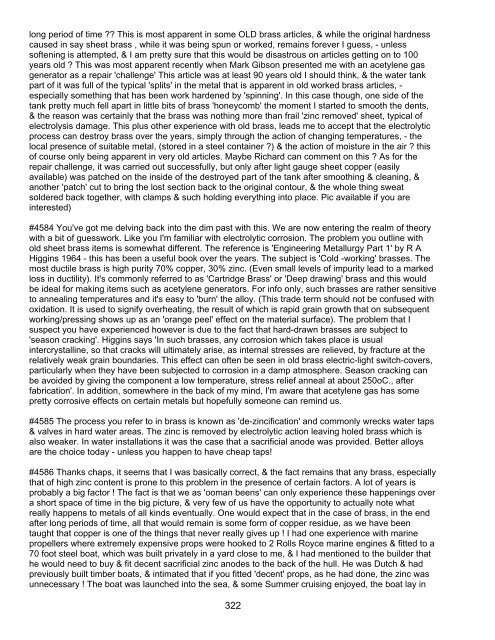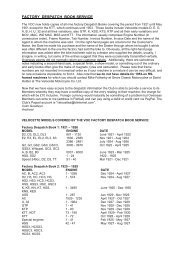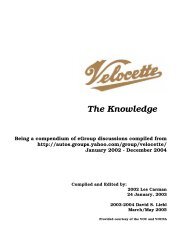The Knowledge - Velocette Owners Club
The Knowledge - Velocette Owners Club
The Knowledge - Velocette Owners Club
Create successful ePaper yourself
Turn your PDF publications into a flip-book with our unique Google optimized e-Paper software.
long period of time ?? This is most apparent in some OLD brass articles, & while the original hardness<br />
caused in say sheet brass , while it was being spun or worked, remains forever I guess, - unless<br />
softening is attempted, & I am pretty sure that this would be disastrous on articles getting on to 100<br />
years old ? This was most apparent recently when Mark Gibson presented me with an acetylene gas<br />
generator as a repair 'challenge' This article was at least 90 years old I should think, & the water tank<br />
part of it was full of the typical 'splits' in the metal that is apparent in old worked brass articles, -<br />
especially something that has been work hardened by 'spinning'. In this case though, one side of the<br />
tank pretty much fell apart in little bits of brass 'honeycomb' the moment I started to smooth the dents,<br />
& the reason was certainly that the brass was nothing more than frail 'zinc removed' sheet, typical of<br />
electrolysis damage. This plus other experience with old brass, leads me to accept that the electrolytic<br />
process can destroy brass over the years, simply through the action of changing temperatures, - the<br />
local presence of suitable metal, (stored in a steel container ?) & the action of moisture in the air ? this<br />
of course only being apparent in very old articles. Maybe Richard can comment on this ? As for the<br />
repair challenge, it was carried out successfully, but only after light gauge sheet copper (easily<br />
available) was patched on the inside of the destroyed part of the tank after smoothing & cleaning, &<br />
another 'patch' cut to bring the lost section back to the original contour, & the whole thing sweat<br />
soldered back together, with clamps & such holding everything into place. Pic available if you are<br />
interested)<br />
#4584 You've got me delving back into the dim past with this. We are now entering the realm of theory<br />
with a bit of guesswork. Like you I'm familiar with electrolytic corrosion. <strong>The</strong> problem you outline with<br />
old sheet brass items is somewhat different. <strong>The</strong> reference is 'Engineering Metallurgy Part 1' by R A<br />
Higgins 1964 - this has been a useful book over the years. <strong>The</strong> subject is 'Cold -working' brasses. <strong>The</strong><br />
most ductile brass is high purity 70% copper, 30% zinc. (Even small levels of impurity lead to a marked<br />
loss in ductility). It's commonly referred to as 'Cartridge Brass' or 'Deep drawing' brass and this would<br />
be ideal for making items such as acetylene generators. For info only, such brasses are rather sensitive<br />
to annealing temperatures and it's easy to 'burn' the alloy. (This trade term should not be confused with<br />
oxidation. It is used to signify overheating, the result of which is rapid grain growth that on subsequent<br />
working/pressing shows up as an 'orange peel' effect on the material surface). <strong>The</strong> problem that I<br />
suspect you have experienced however is due to the fact that hard-drawn brasses are subject to<br />
'season cracking'. Higgins says 'In such brasses, any corrosion which takes place is usual<br />
intercrystalline, so that cracks will ultimately arise, as internal stresses are relieved, by fracture at the<br />
relatively weak grain boundaries. This effect can often be seen in old brass electric-light switch-covers,<br />
particularly when they have been subjected to corrosion in a damp atmosphere. Season cracking can<br />
be avoided by giving the component a low temperature, stress relief anneal at about 250oC., after<br />
fabrication'. In addition, somewhere in the back of my mind, I'm aware that acetylene gas has some<br />
pretty corrosive effects on certain metals but hopefully someone can remind us.<br />
#4585 <strong>The</strong> process you refer to in brass is known as 'de-zincification' and commonly wrecks water taps<br />
& valves in hard water areas. <strong>The</strong> zinc is removed by electrolytic action leaving holed brass which is<br />
also weaker. In water installations it was the case that a sacrificial anode was provided. Better alloys<br />
are the choice today - unless you happen to have cheap taps!<br />
#4586 Thanks chaps, it seems that I was basically correct, & the fact remains that any brass, especially<br />
that of high zinc content is prone to this problem in the presence of certain factors. A lot of years is<br />
probably a big factor ! <strong>The</strong> fact is that we as 'ooman beens' can only experience these happenings over<br />
a short space of time in the big picture, & very few of us have the opportunity to actually note what<br />
really happens to metals of all kinds eventually. One would expect that in the case of brass, in the end<br />
after long periods of time, all that would remain is some form of copper residue, as we have been<br />
taught that copper is one of the things that never really gives up ! I had one experience with marine<br />
propellers where extremely expensive props were hooked to 2 Rolls Royce marine engines & fitted to a<br />
70 foot steel boat, which was built privately in a yard close to me, & I had mentioned to the builder that<br />
he would need to buy & fit decent sacrificial zinc anodes to the back of the hull. He was Dutch & had<br />
previously built timber boats, & intimated that if you fitted 'decent' props, as he had done, the zinc was<br />
unnecessary ! <strong>The</strong> boat was launched into the sea, & some Summer cruising enjoyed, the boat lay in<br />
322





